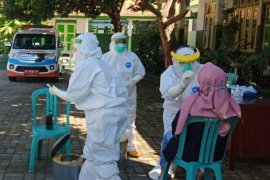The Doherty Institute is a joint venture between the University of Melbourne and Royal Melbourne Hospital.
Monash Biomedicine Discovery Institute’s Dr Kylie Wagstaff, who led the study, said the scientists discovered that the drug, Ivermectin, stalled the growth of the SARS-CoV-2 virus in cell culture within 48 hours, according to a statement received in Jakarta, Saturday.
“We found that even a single dose could essentially remove all viral RNA by 48 hours, and a really significant reduction in it was observed even in 24 hours,” Dr Wagstaff pointed out.
Ivermectin is an FDA-approved anti-parasitic drug also found to be effective in-vitro against a broad range of viruses, including HIV, Dengue, Influenza, and Zika virus.
Dr Wagstaff drew attention to the fact that the tests conducted in the study were in-vitro and called for the need to carry out trials on people.
“Ivermectin is widely used and viewed as a safe drug. We need to figure out now whether the dosage you can use it at in humans will be effective – that is the next step,” Dr Wagstaff expounded.
“We live in times where we face a global pandemic, with no approved treatment to tackle it. If we had a compound that was already available around the world then that might help people sooner. Realistically, it is going to be a while before a vaccine is broadly available,” he pointed out.
Despite the mechanism by which Ivermectin kills the virus yet being unknown, it is likely, based on its action on other viruses, that it works to stop the virus “dampening down” the host cells’ ability to clear it, Dr Wagstaff stated.
Royal Melbourne Hospital’s Dr Leon Caly, a senior medical scientist at the Victorian Infectious Diseases Reference Laboratory (VIDRL) at the Doherty Institute where the experiments with live coronavirus were conducted, is the study’s first author.
“As the virologist, who was part of the team that was the first to isolate and share SARS-COV2 outside of China in January 2020, I am excited about the prospect of Ivermectin being used as a potential drug against COVID-19,” Dr Caly remarked.
Earlier, Dr Wagstaff had made a breakthrough finding on Ivermectin in 2012 when she identified the drug and its antiviral activity along with Monash Biomedicine Discovery Institute’s Professor David Jans, also an author on this paper. Professor Jans and his team have been conducting research on Ivermectin for over a decade with different viruses.
Dr Wagstaff and Professor Jans began investigating whether it worked against the SARS-CoV-2 virus as soon as the pandemic was known to have started.
The use of Ivermectin to combat COVID-19 would depend on the results of further pre-clinical testing and ultimately clinical trials, with funding urgently required to ensure that the work progressed unhindered, Dr Wagstaff noted.
Related news: Xi vows to assist Indonesia to tackle COVID-19 outbreak
Related news: Chamber provide 100,000 rapid test kits to DKI Jakarta Government
Related news: Jakarta records nearly one thousand confirmed COVID-19 cases
Reporter: Azis Kurmala
Editor: Sri Haryati
Copyright © ANTARA 2020












